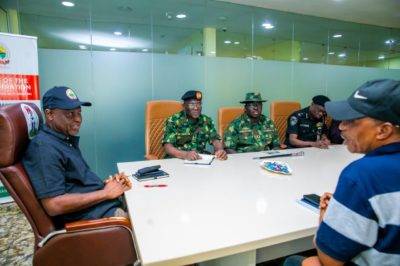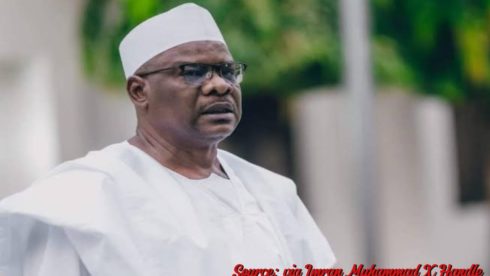The Nigerian Army finds itself embroiled in controversy following viral petitions penned by the Coalition of Bokkos Ethnic Youth Nationalities, decrying alleged civilian shootings and the exacerbation of vulnerability among Bokkos residents. The petitions, one of which demands the removal of the Commander of Step-Up Headquarters 2 in Bokkos, have ignited a firestorm of debate surrounding the military’s conduct during recent hostilities.
Disputing the allegations, the Nigerian Army has vehemently denied any wrongdoing, asserting that the accusations are baseless attempts to undermine their ongoing efforts to dismantle militia groups in the region. In a bid to set the record straight and salvage their reputation, the Nigerian Army has refuted claims of their failure to quell the violence, insisting that their prompt response prevented further bloodshed. During the attacks on April 13, 2024, forces swiftly mobilized in response to distress calls, forcing assailants to retreat and thwarting their nefarious intentions. Tragically, casualties were reported, with fatalities and injuries occurring in both Kopnanle and Mandang Mushu communities. However, the Nigerian Army maintains that their actions were necessary to restore peace and safeguard law-abiding citizens.
Vulnerability of Bokkos Residents Amidst Ongoing Conflict
Amidst the turmoil, the vulnerability of Bokkos residents has been laid bare, as they find themselves caught in the crossfire of escalating violence. The allegations of civilian shootings have only served to exacerbate tensions and deepen mistrust between the community and the military. Concerns over the safety and security of civilians loom large, with many fearing for their lives as militia groups continue to wreak havoc in the region.
The situation is further compounded by the intricate web of ethnic rivalries that permeate the area, fueling a cycle of violence and retribution. As rival factions clash for supremacy, innocent civilians are left to bear the brunt of the bloodshed, their lives hanging in the balance. Despite the Nigerian Army’s assurances of protection, the recent events have eroded confidence in their ability to maintain peace and stability in Bokkos.
Nigerian Army Clarifying Misconceptions Surrounding Vigilante Actions
In the midst of the chaos, allegations of the Nigerian Army’s involvement in the killing of vigilantes have added another layer of complexity to the situation. However, the Nigerian Army has vehemently denied any wrongdoing, asserting that their primary focus remains on restoring order and quelling hostilities between rival militia groups. Contrary to claims of a confrontation with vigilantes, the Nigerian Army contends that they were engaged in efforts to neutralize armed militias and protect civilian populations.
Furthermore, evidence uncovered at the scene suggests that the deceased individual purported to be a vigilante was, in fact, an active participant in the violence, wielding sophisticated weaponry. The discovery of ammunition in their possession underscores the complexity of the situation and challenges the prevailing narrative surrounding their role in the conflict. As the truth slowly emerges from the fog of war, the Nigerian Army remains steadfast in their commitment to upholding law and order, even in the face of adversity and unfounded accusations.
Allegations Against Colonel CY Ofurumazi
The recent establishment of the Step-Up Headquarters in Bokkos has stirred controversy as calls for the removal of Colonel CY Ofurumazi, the appointed commander, have surfaced. These calls, deemed malicious by some, are rooted in the heightened military operations in the region. Under Colonel Ofurumazi’s leadership, troops have intensified their operations, disrupting the activities of criminal elements on both sides of the divide. This increased tempo has significantly curtailed the freedom of action for these elements, prompting pushback from certain quarters.
The petitioners, expressing their desperation, have cited Colonel Ofurumazi’s impartial stance during recent attacks. These attacks, which were already being given a religious connotation, threatened to instigate further violence and spill over into other parts of Plateau State. Despite pressure, Colonel Ofurumazi maintained his neutrality and refused to yield to demands that could compromise his position. This refusal, while commendable to some, has only fueled the ire of those seeking his removal, deepening the divide in the region.
Implications for Security and Stability
The controversy surrounding Colonel Ofurumazi’s leadership raises concerns about the implications for security and stability in the Bokkos region. On one hand, the increased military presence and proactive measures have proven effective in countering criminal activities, providing a semblance of safety for residents. However, the call for the removal of Colonel Ofurumazi threatens to disrupt these efforts and undermine the progress made in restoring peace to the area.
Furthermore, the polarization resulting from this controversy poses a significant challenge to ongoing peace-building efforts in Plateau State. The religious connotation attached to recent attacks has the potential to exacerbate existing tensions and ignite further violence if not addressed promptly and effectively. It is imperative for all stakeholders to engage in constructive dialogue and seek peaceful resolutions to prevent the escalation of conflict and ensure the security and stability of the region.
Table of Contents
Discover more from OGM News NG
Subscribe to get the latest posts sent to your email.













